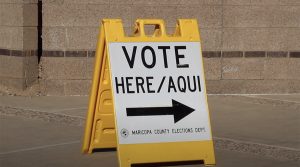- Slug: BC-CNS COVID and Voting, 1,105 words.
- 3 photos and captions below.
- Video link here
- Audio link here
Eds: A previous version of this story included a misspelling of Erika Flores’ name and provided inaccurate information about requirements for voters at the vote centers. The story below fixes the misspelling in graf eight and updates information in graf 13. Clients who used the earlier version of the story are asked to run the correction found here.
By Frankie McLister
Cronkite News
PHOENIX — Melissa Calles used to walk her dog to the park every day, and she was part of a dance group. Life changed for the 26-year-old Phoenix resident on May 15 when she fell ill. After tests, her doctor informed her she had COVID-19.
“I lost my sense of smell, that was the first symptom in my experience, and I had a mild fever and headache,” she said. “But the most prominent symptom was shortness of breath.”
According to Maricopa County’s website, 50% of COVID-19 cases and 40% of hospitalizations in the county involve Hispanics, including Calles.
“I felt like I was running a marathon,” she said of her fatigue. “Even going to the bathroom left me agitated and lightheaded, and I have to take a break from that.”
Calles is among the estimated 24% of Arizona’s eligible voters who are Latino. A Jan. 30 report by the Pew Research Center indicates that Arizona is among the top states for Latino eligible voters in the 2020 election, with 1.2 million.
Members of Mi Familia Vota, a national nonprofit working to unite the Latino community through voter participation, said they are watching the high numbers of COVID-19 cases in Maricopa County. They are informing the Hispanic community about taking health precautions while voting.
“You don’t have to line up, you don’t have to be in big groups because of the pandemic we’re living in,” said Cristian Avila, the group’s national coordinator for civic engagement.
Voting in 2020 will be different because of the COVID-19 pandemic. Voters will have many options, said Erika Flores, deputy director of communications for the Maricopa County Elections Department.
“You don’t have only one day or only one location to go voting, we have voting centers, so they can go to any of these centers,” Flores said. “We are going to have about 100 voting centers, and about 50 will be open for about 14 days, and those days, they will be open weekends and will be open late so people can go vote after work.”
Serving more than 2.3 million registered voters, the Maricopa County Elections Department provides towns, school districts and special districts with information regarding voting and selection of local and national leaders. July 8 marked the beginning of early voting for the Aug. 4 primary. More than 1.3 million ballots were mailed to voters, according to an email sent to Cronkite News by elections officials, and in-person voting centers already are open.
“We are facing a health crisis that has not been seen in generations,” Board of Supervisors Chairman Clint Hickman said on the county’s website. “With historic turnout expected, our goal is to provide all Maricopa County voters with a safe and secure August primary election.”
County authorities recently approved the plan for the 2020 August primary, which includes new measures to ensure the safety of voters and poll workers.
Maricopa County primary election plan includes:
- Increased access to voting by mail.
- Safety protocols for ballot processing.
- Voters will have access to hand washing stations, hand sanitizer and will be offered masks and gloves. Vote centers will provide space for physical distancing as well.
- Voting centers will be at convention centers, malls and retail facilities.
- Voters will have 90 to 100 polling locations to choose from on Election Day.
- Voting centers are located across the county, including on tribal land and in rural areas to provide in-person voting as an option for all communities.
– Source: Maricopa County Elections Department
The August 2020 voter option campaign is providing information to voters about their safety with special emphasis on voting by mail.
Avila said Mi Familia Vota also is recommending voting by mail. But if people vote in person, they should wear their masks and follow social-distancing guidelines.
County elections officials said they are confident they’re prepared for voting during a pandemic.
“It’s important that voters know that we are implementing all measures so they are safe when they go to vote,” Flores said. “Voting centers are big enough for physical distancing, something that is very important.”
Calles said she will vote in person, but she is worried because, although she already had the virus, she doesn’t want to get it again. At the moment, according to the World Health Organization, there is “no evidence that people who have recovered from COVID-19 and have antibodies are protected from a second infection.”
“I am going to have that constant fear that won’t go away,” Calles said. “The fact that there will be a lot of people around makes me nervous, but that is not a good reason not to go and vote. I am going to take my mask, gloves, and I hope people do the same because we have to be watching for each other.”
Flores said the Maricopa County Elections Department is prepared for more than 700,000 voters to cast ballots Aug. 4. The last day to request a ballot in the mail is next Friday, July 24.
“If you want to vote in person, we are going to implement physical distancing,” she said. “Also, we will be disinfecting everything – including pens. Workers will be using masks, gloves and also we will have gloves for voters. The locations are big enough to practice physical distancing, something very important that we have to do during this pandemic.”
It’s been just more than two months since Calles got COVID-19, and she said she still isn’t fully recovered. She has to use an inhaler two or three times a day, and she tires easily. She returned to work using a mask and gloves and said she has maintained social distance. At home, she said she stays in her room, disinfects everything and still maintains 6 feet of distance from family members.
“Now I value time with my family and loved ones. I am very fortunate because I am recovering, and I was able to stay at home. That was not the case for others. That made me feel grateful, to be patient and take cautions for others.”
For more stories from Cronkite News, visit cronkitenews.azpbs.org.
^__=


